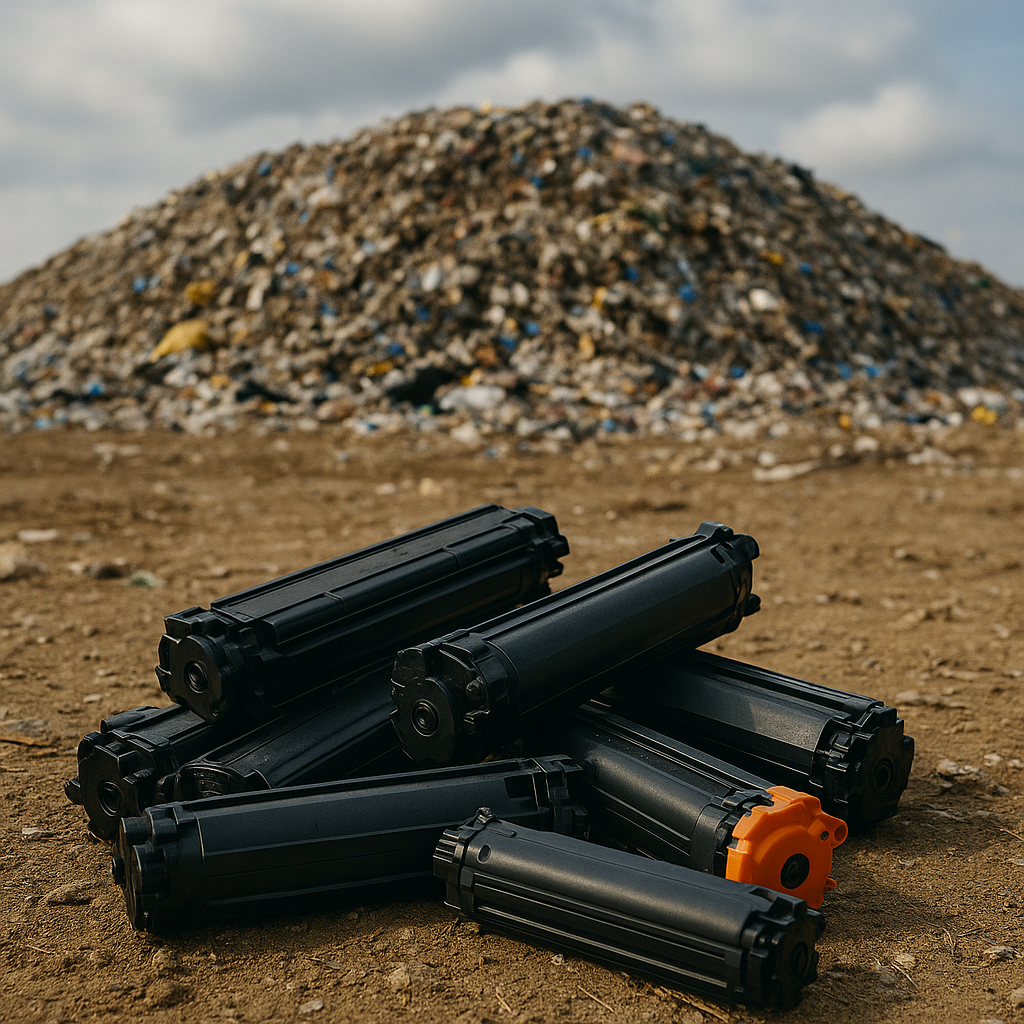
Why Cheap Generic Compatible Toner Cartridges Can't Be Recycled
Share
Why Cheap Generic Compatible Toner Cartridges Can't Be Remanufactured
When shopping for toner, it’s easy to be tempted by the lowest price. Generic compatible cartridges—especially those sold by overseas sellers or bargain marketplaces—often seem like a great deal. But these cheap alternatives come with a hidden cost: they can't be remanufactured. Here's why that matters.
First, What Are Generic Compatible Cartridges?
Generic compatibles are newly manufactured toner cartridges designed to mimic OEM (original equipment manufacturer) cartridges. They’re not made by the printer manufacturer, nor do they use any OEM parts. Instead, they’re built entirely from new, low-cost components—most often sourced and assembled overseas.
Unlike remanufactured cartridges, which are built using an original OEM cartridge as the base, generic compatibles are a one-and-done product. They’re designed to be used once, then discarded.
The Key Difference: OEM vs. Clone Construction
Remanufacturers rely on empty OEM cartridges because they’re built to last. An OEM cartridge is like a quality chassis—it has the structural integrity, engineering tolerances, and high-grade materials needed for multiple uses. When it's empty, remanufacturers can carefully clean, repair, and refill it to give it a second life—often with performance indistinguishable from new.
Cheap generic compatibles? Not so much. Here’s why:
- Substandard Materials: Generic compatibles are often made from brittle or poorly molded plastic that cracks, warps, or degrades after a single use1.
- Non-Standard Design: Many generics deviate from OEM specifications, making it impossible to remanufacture them to work reliably2.
- Proprietary Lockouts: Some are built with chips or components that deliberately prevent reuse or remanufacturing7.
- Single-Use Components: Key parts like the drum or wiper blade are built to barely survive one cycle—if that.
In short: they’re designed for the landfill.
Environmental Consequences
The inability to remanufacture generic compatibles creates a serious sustainability problem. These cartridges typically end up in landfills or incinerators, adding to e-waste and environmental pollution. In contrast, remanufactured cartridges:
- Extend the life of quality OEM plastic and metal parts
- Reduce the demand for virgin materials
- Help close the loop in the circular economy34
So while a generic compatible may cost less upfront, it creates more waste—and zero opportunities for reuse.
Economic Impacts
There’s another cost, too: jobs. U.S.-based remanufacturers employ American workers to clean, rebuild, test, and quality-check remanufactured cartridges. This industry depends on a steady supply of OEM empties to continue operating5.
When consumers buy generic compatibles that can't be reused, it chokes the supply chain for remanufacturers and undermines American jobs. Embracing a circular economy model benefits the environment and the economy6.
The Bottom Line
Cheap toner often isn't cheap in the long run. Generic compatible cartridges may save you a few dollars today, but they contribute to a cycle of waste, pollution, and lost opportunity.
At NorthStar Toner, we believe in doing things differently. All of our cartridges are remanufactured in the USA using OEM cores. That means:
- Higher quality and reliability
- Reusable, recyclable components
- A real impact on sustainability and American manufacturing
So next time you need toner, ask yourself: do I want to save a few dollars now—or invest in quality, sustainability, and American jobs?
📚 Footnotes
- International Imaging Technology Council. Why New Build Cartridges Can’t Be Remanufactured. I-ITC. https://i-itc.org
- The Recycler Magazine. Risks of Using Cheap New-Build Compatible Cartridges. https://www.therecycler.com
- United States Environmental Protection Agency. Sustainable Management of Electronics. EPA. https://www.epa.gov/smm-electronics
- Green America. Recycling Printer Cartridges: What You Need to Know. https://www.greenamerica.org
- United States International Trade Commission (USITC). Remanufacturing Industries in the United States. https://www.usitc.gov
- Ellen MacArthur Foundation. The Circular Economy: A Wealth of Flows. https://ellenmacarthurfoundation.org
- Canon USA. Toner Cartridge IP Enforcement and New Build Clone Warnings. https://www.usa.canon.com
